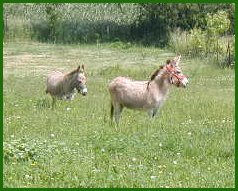

These are my miniature mediterranian donkeys! They arrived on June 23rd, 2005. Miniature donkeys are classified by their height at the withers (shoulder). A miniature donkey is 36" or less. Marigold and Heather are about 34" at the withers.
Marigold is on the left and Heather is on the right.
Marigold is a gray-dun and seems to be more of the laid back type. Heather is a rose colored dun. She is the guardian of the two. If she leads, Marigold will follow.
The Miniature Donkey Registry recognizes the following coat colors: "Gray-Dun; Gray, Black or Red Roan; True Gray; Black; Albino-White; Sorrel; Bay; Brown; Spotted; Few Spot White (spotted); Unusual Colors".
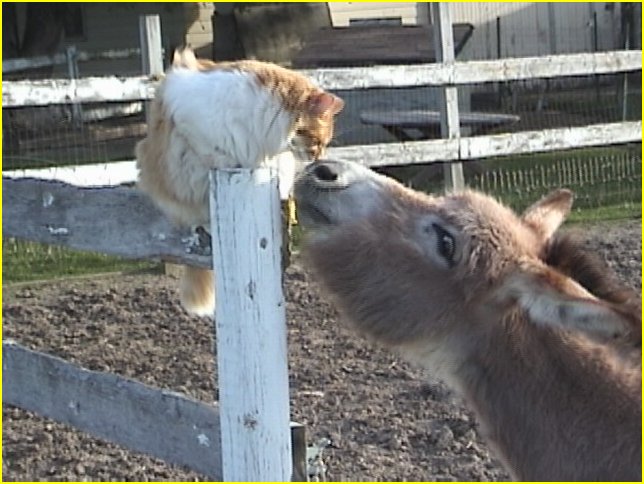
Miniature Donkeys are a compact, well-proportioned animal with a sweet, sociable disposition. At maturity (3 years), a mini donkey is able to pull a cart or carry a pack as it did in its native Sicily and Sardinia.
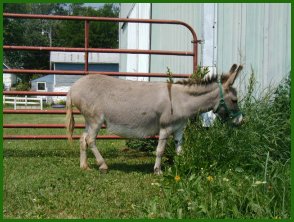
Marigold had a foal on 8/26/05 and Heather had her foal on June 6, 2006. The gestation period of a donkey is 12 months (give or take some, there are reports of up to 13½ months). When the foal is born, it will be on it's feet within the first hour. Equines are relatively developed at birth. The baby can walk, and run on its first day.
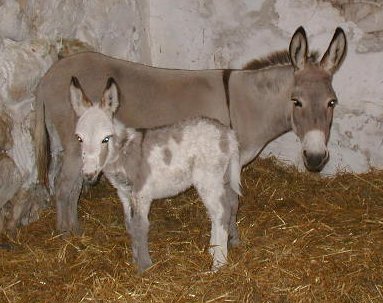
An equine foal (horse, donkey, mule or zebra) is usually able to eat adult food (ie grain or grass) at a month old, although they don't get much value from it. By 4 months, they are nearly ready to switch off mother's milk and start eating grain or grass. They should be weaned by no later than 9 months old (mother's milk drops off in content before this, and it's harder to separate the bond if you wait longer) but they are still very immature in body.
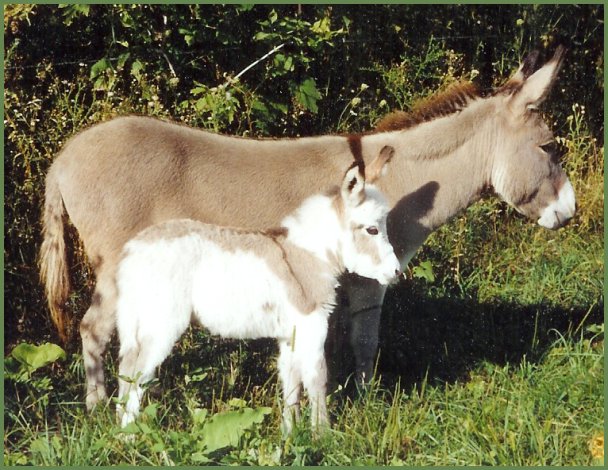
Marigold and her foal, Morning Glory or "Glo" for short.

Aladdin, owned by Falcon Point Farm, is a spotted jack. He is the sire of Morning Glory as well as Heather's foal that was born in June. See photos of new foal.
Jacks are not for everyone. Jacks require special handling and special housing. This usually means you don't keep the jack and jennet together. Some people do - but how will the jack react to the newborn foal? Some jacks (and horse stallions) will savage and even kill newborn foals, even their own. We do not plan to keep a jack and if one of the foals is a jack he will be sold.
For more information on donkeys in general visit The American Donkey and Mule Society's web pages or contact the Miniature Donkey Registry, c/o American Donkey and Mule Society, 2901 N. Elm St., Denton, Texas 76201.
© 2003-2005 Deb Hamele, Dunn's Marsh Labradors/Dunn's Marsh Designs.
All rights reserved.